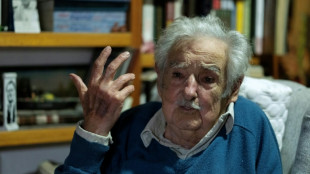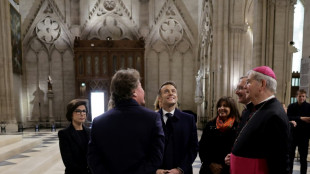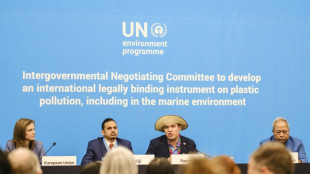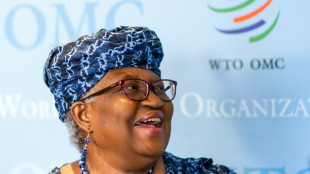
-
 Trudeau in Florida to meet Trump as tariff threats loom: media
Trudeau in Florida to meet Trump as tariff threats loom: media
-
Hunter shines as Hawks top Cavs again

-
 Southampton denied shock Brighton win by dubious VAR call
Southampton denied shock Brighton win by dubious VAR call
-
Alarm over high rate of HIV infections among young women, girls

-
 Swiss unveil Euro 2025 mascot Maddli
Swiss unveil Euro 2025 mascot Maddli
-
Bears fire coach Eberflus after latest agonizing NFL defeat

-
 Rallies mark one month since Spain's catastrophic floods
Rallies mark one month since Spain's catastrophic floods
-
Arnault family's Paris FC takeover completed

-
 Georgian police stage new crackdown on pro-EU protestors
Georgian police stage new crackdown on pro-EU protestors
-
'We're messing up:' Uruguay icon Mujica on strongman rule in Latin America

-
 Liverpool dealt Konate injury blow
Liverpool dealt Konate injury blow
-
Van Nistelrooy appointed Leicester manager

-
 Verstappen brought back to earth in Doha after F1 title party
Verstappen brought back to earth in Doha after F1 title party
-
Global wine output to hit lowest level since 1961

-
 Norris boosts McLaren title hopes with sprint pole
Norris boosts McLaren title hopes with sprint pole
-
Big-hitting Stubbs takes satisfaction from grinding out Test century

-
 Romania recounts presidential ballots as parliamentary vote looms
Romania recounts presidential ballots as parliamentary vote looms
-
French skipper Dalin leads as Vendee Globe passes Cape of Good Hope

-
 Chelsea not in Premier League title race, says Maresca
Chelsea not in Premier League title race, says Maresca
-
Brazil's Bolsonaro aims to ride Trump wave back to office: WSJ

-
 France requests transfer of death row convict held in Indonesia: minister
France requests transfer of death row convict held in Indonesia: minister
-
'Mamie Charge': Migrants find safe haven in Frenchwoman's garage

-
 Iconic Uruguayan ex-leader hails country's swing left as 'farewell gift'
Iconic Uruguayan ex-leader hails country's swing left as 'farewell gift'
-
Thousands rally in Georgia after violent police crackdown on pro-EU protesters

-
 Shared experiences make Murray 'perfect coach', says Djokovic
Shared experiences make Murray 'perfect coach', says Djokovic
-
Iran, Europeans to keep talking as tensions ratchet up

-
 Inflation-wary US consumers flock to 'Black Friday' deals
Inflation-wary US consumers flock to 'Black Friday' deals
-
France shows off restored Notre Dame after 'impossible' restoration

-
 South African bowlers strike after Sri Lanka set big target
South African bowlers strike after Sri Lanka set big target
-
Namibia reopens polls after election chaos in ruling party test

-
 Georgia police arrest dozens in clashes with pro-EU protesters
Georgia police arrest dozens in clashes with pro-EU protesters
-
US stocks rise on Black Friday

-
 Leclerc on top for Ferrari in Qatar GP practice
Leclerc on top for Ferrari in Qatar GP practice
-
Jihadists, allies enter Syria's second city in lightning assault

-
 Amorim puts faith in Mount to turn around Man Utd career
Amorim puts faith in Mount to turn around Man Utd career
-
Guardiola will not 'run' from Man City rebuild

-
 Assisted dying campaigners, opponents rally at UK parliament
Assisted dying campaigners, opponents rally at UK parliament
-
Durable prop Healy set to carve name in Irish rugby history

-
 Macron unveils Notre Dame after 'impossible' restoration
Macron unveils Notre Dame after 'impossible' restoration
-
Traumatised Spain marks one month since catastrophic floods

-
 Yen rallies, euro up on rising inflation data
Yen rallies, euro up on rising inflation data
-
Attack-minded Spurs boss Postecoglou says: 'You'll miss me when I'm gone'

-
 Syria jihadists, allies shell major city Aleppo in shock offensive
Syria jihadists, allies shell major city Aleppo in shock offensive
-
Macron inspects 'sublime' Notre Dame after reconstruction

-
 Arsenal must be near-perfect to catch Liverpool, says Arteta
Arsenal must be near-perfect to catch Liverpool, says Arteta
-
Arrests, intimidation stoke fear in Pakistan's politics

-
 Showdown looms on plastic treaty days before deadline
Showdown looms on plastic treaty days before deadline
-
Ngozi Okonjo-Iweala: the WTO's trailblazing motivator

-
 WTO chief reappointed as Trump threat looms
WTO chief reappointed as Trump threat looms
-
US landmine offer to Ukraine throws treaty into 'crisis': campaign group


Japanese atomic bomb survivor group Nihon Hidankyo wins Nobel Peace Prize
The Nobel Peace Prize was on Friday awarded to the Japanese anti-nuclear group Nihon Hidankyo, a grassroots movement of atomic bomb survivors from Hiroshima and Nagasaki, also known as Hibakusha.
The group, founded in 1956, received the honour "for its efforts to achieve a world free of nuclear weapons and for demonstrating through witness testimony that nuclear weapons must never be used again," said Jorgen Watne Frydnes, the chair of the Norwegian Nobel Committee in Oslo.
The co-head of the group expressed surprise at winning the award.
"Never did I dream this could happen," Toshiyuki Mimaki told reporters in Tokyo with tears in his eyes.
The Nobel committee expressed alarm that the international "nuclear taboo" that developed in response to the atomic bomb attacks of August 1945 was "under pressure".
The war in Ukraine has recently heightened concerns about the risk of nuclear war, in particular with Russia's announcement that it plans to review its doctrine on the use of the atomic weapons.
"This year's prize is a prize that focuses on the necessity of upholding this nuclear taboo. And we all have a responsibility, particularly the nuclear powers," Frydnes told reporters.
Japan's Prime Minister Shigeru Ishiba said the award for Nihon Hidankyo was "extremely meaningful".
- 'Greater destructive power -
The committee noted that next year will mark 80 years since two American atomic bombs killed an estimated 120,000 inhabitants of Hiroshima and Nagasaki, and a comparable number later died of burn and radiation injuries.
"Today's nuclear weapons have far greater destructive power. They can kill millions and would impact the climate catastrophically," Frydnes said.
The committee noted that nuclear powers are modernising and upgrading their arsenals.
"New countries appear to be preparing to acquire nuclear weapons and threats are being made to use nuclear weapons in ongoing warfare," Frydnes said.
"A nuclear war could destroy our civilisation," he warned.
With wars raging around the world, Nobel-watchers had struggled to predict this year's laureate, with full-scale conflicts in Ukraine and the Middle East, famine in Sudan, and a collapsing climate painting a grim picture of world affairs.
According to the Uppsala Conflict Data Program, there were 59 armed conflicts in the world in 2023, which is almost double the number in 2009.
At the Tokyo news conference, Mimaki said the situation for children in Gaza is similar to that of Japanese children at the end of World War II.
"In Gaza, children in blood are being held. It's like in Japan 80 years ago," he said.
Prior to Friday's announcement, the secretary of the Norwegian Nobel Committee, Olav Njolstad, acknowledged in an interview with AFP that "it's hard to be an optimist when you look around in the world today."
But given that context, rewarding peace efforts was "perhaps more important than ever", he said.
Last year, the prestigious prize went to imprisoned women's rights campaigner Narges Mohammadi for her fight against the oppression of women in Iran.
This year, a total of 286 candidates -- 197 individuals and 89 organisations -- are known to have been nominated, though the Nobel Committee keeps the candidates' names secret for 50 years.
- A men's year, again -
The Peace Prize is the only Nobel awarded in Oslo, with the other disciplines announced in Stockholm.
This year's Nobel season has been a predominantly male, Anglo-Saxon affair, with seven North Americans or Britons honoured, including with two prizes celebrating artificial intelligence (AI).
On Monday, the medicine prize went to US duo Victor Ambros and Gary Ruvkun for their discovery of microRNA, a previously unknown type of genetic switch that could pave the way for new medical breakthroughs.
Tuesday's physics prize honoured Canadian-Briton Geoffrey Hinton and American physicist John Hopfield for pioneering work on the foundations of AI.
The chemistry prize on Wednesday was awarded to David Baker and John Jumper of the US, and Demis Hassabis of Britain, for work revealing the secrets of proteins through computing and AI.
On Thursday, the Nobel Prize in Literature went to the only woman honoured so far this year, South Korean author Han Kang, for her work exploring the correspondence between mental and physical torment as well as historical events.
The Nobel season winds up Monday with the economics prize.
The Nobel Prizes consist of a diploma, a gold medal and a $1 million prize sum. They will be presented at ceremonies in Stockholm and Oslo on December 10, the anniversary of the 1896 death of scientist and prize creator Alfred Nobel.
L.Dubois--BTB
